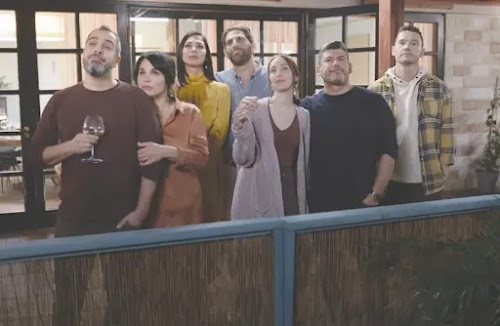Lior Ashkenazi is well-known as one of the most outstanding
actors in the Israeli film world. He has
starred in numerous excellent Israeli films, including Late Marriage,
Walk on Water, Norman, Footnote, Foxtrot. With his directing debut, Perfect
Strangers, we see his talent also as a director! This film is both humorous and serious, it is
fast-paced, strongly directed and edited, and superbly acted.
The film is based on the Italian award-winning film of the
same title directed by Paolo Genovese (2016), which seats a bunch of couples
around a table, and one suggests putting their cellphones in the middle. Thus, all the participants end up sharing their
messages and phone calls that come in during the evening. Certainly, a recipe for disaster! Would you
share all the details of your life with your friends?
Lior Ashkenazi’s local cultural version of the film is full
of twists and turns. It offers us
insights into seven friends, all of them around a dinner table, and makes the
outcome into a uniquely Israeli story, with secrets big and small. The film takes place in a comfortable suburb,
where upper middle-class friends joke about how terrible it would be to live in
Tel Aviv. They have a real suburban
lifestyle and the host of the evening is very proud of his new gas grill on his
beautiful balcony, on which he cooks all kinds of ostentatious meat dishes,
reflecting his over-the-top cultural milieu.

The conversation begins as lightweight and humorous, and at
first, I thought the film was a great comedy, but we soon discover it has a
dark side to it as well. Slowly there arises a real competition among the
participants and many personal problems are brought up, including lying about
how one’s business is doing, and sharing problems with regard to child-rearing.
After the cellphones are placed in the middle of the table, the tone of the banter
begins to shift from light to heavy, as some sensational secrets emerge.
We all live behind a curtain of a certain amount of fiction.
I will not reveal any spoilers about some of the secrets that are revealed that
lead to more and more complications among the friends at the table. Nor will I share
anything about the remarkable denouement, which gives the plot a whole new paradoxical
meaning. Suffice it to say that the film is full of surprises.
I really enjoyed this film.
The script was tight and complex – it deals with many issues in Israeli
society, including problems of post-trauma from experiences in the army and the
nuanced nature of Israel society’s struggles relating to people in the LGBTQ community.
It is labelled as both a comedy and a drama, and I now understand why. Freud
would have loved this film as well!
Take a look at the trailer (Hebrew only).



